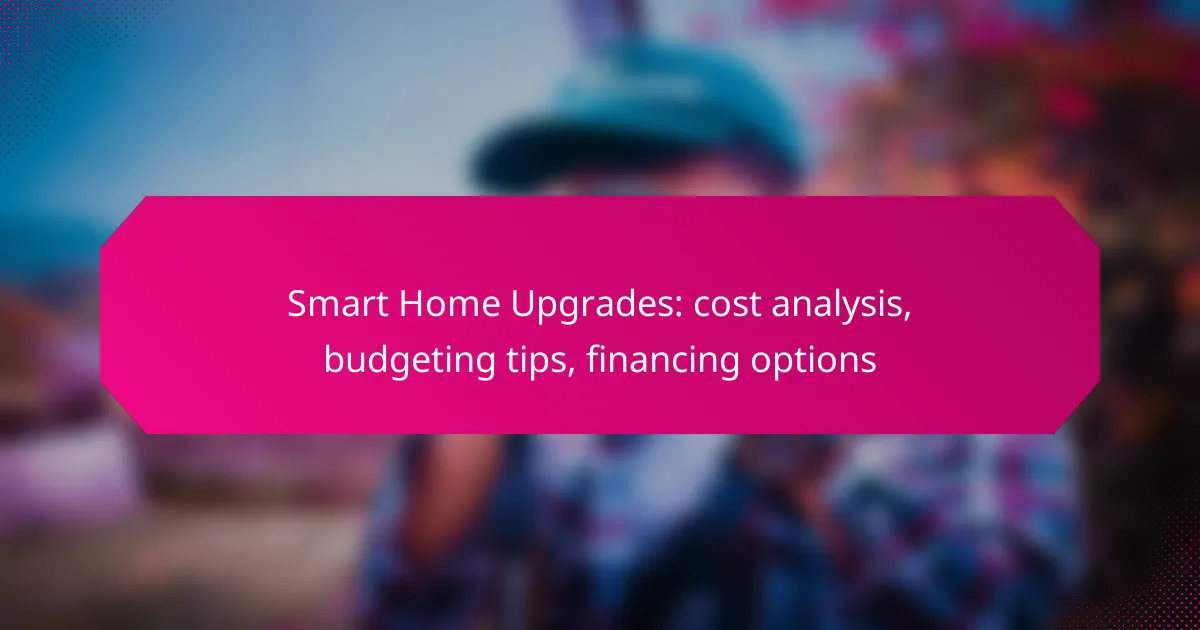Upgrading to a smart home can significantly enhance convenience, security, and energy efficiency for UK homeowners. However, the costs can vary widely, ranging from a few hundred to several thousand pounds depending on the technology and installation needs. By setting a clear budget and prioritizing essential upgrades, homeowners can effectively manage expenses while enjoying the benefits of modern smart home solutions.
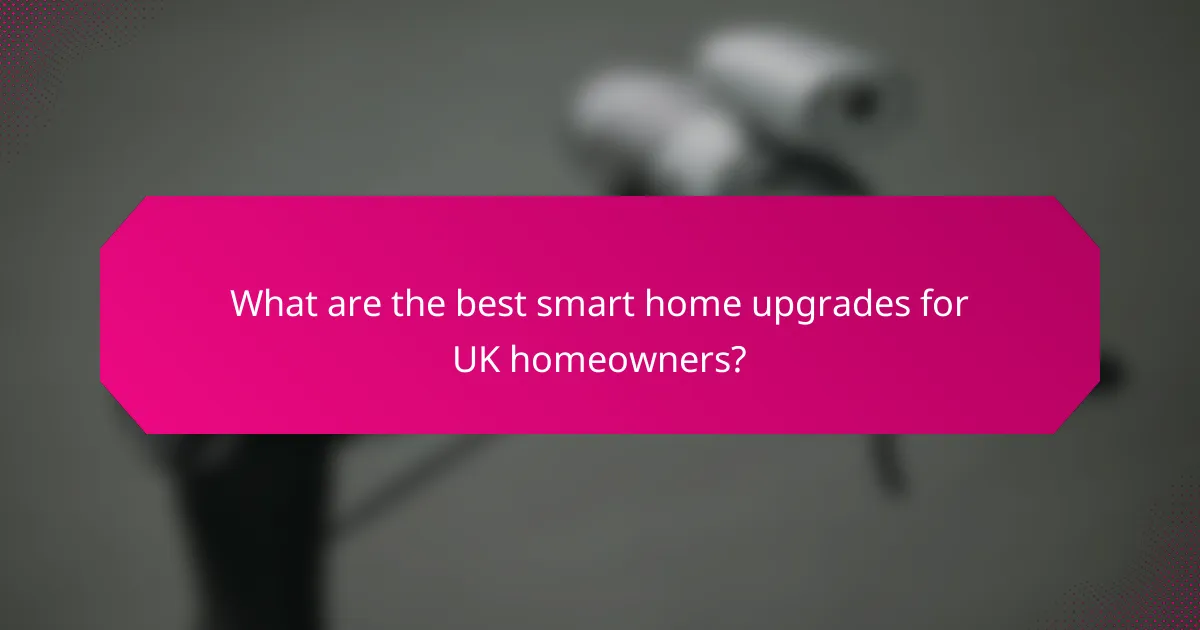
What are the best smart home upgrades for UK homeowners?
The best smart home upgrades for UK homeowners include smart lighting systems, smart thermostats, home security cameras, smart speakers, and smart locks. These upgrades enhance convenience, security, and energy efficiency, making homes more modern and user-friendly.
Smart lighting systems
Smart lighting systems allow homeowners to control their lights remotely via smartphones or voice commands. These systems can include features like dimming, color changes, and scheduling, which can help save energy and create the desired ambiance.
When choosing smart lighting, consider compatibility with existing fixtures and the type of bulbs needed. Popular options include Philips Hue and LIFX, with costs typically ranging from £20 to £200 depending on the complexity and number of lights.
Smart thermostats
Smart thermostats enable precise control of home heating and cooling systems, often learning user habits to optimize energy use. They can be programmed or adjusted remotely, leading to potential savings on energy bills.
Look for models that are compatible with your heating system, such as Nest or Hive, with prices generally between £100 and £250. Installation may require professional help, especially for complex systems.
Home security cameras
Home security cameras provide real-time monitoring and alerts for unusual activity, enhancing home security. Many systems offer cloud storage options and can be accessed via mobile apps, allowing homeowners to keep an eye on their property from anywhere.
Consider features like resolution, night vision, and two-way audio when selecting a camera. Prices can vary widely, from around £30 for basic models to over £300 for advanced systems with multiple features.
Smart speakers
Smart speakers serve as central hubs for controlling other smart devices through voice commands. They can play music, provide information, and integrate with various smart home systems, making them versatile additions to any home.
Popular options include Amazon Echo and Google Nest, with prices typically ranging from £50 to £200. Ensure compatibility with your existing smart devices for seamless integration.
Smart locks
Smart locks enhance home security by allowing keyless entry through smartphones or keypads. They can be programmed to grant temporary access to guests and can be monitored remotely, providing peace of mind for homeowners.
When selecting a smart lock, consider the type of door and existing hardware. Prices usually range from £100 to £300, and installation may require professional assistance for optimal security and functionality.

How much do smart home upgrades cost in the UK?
Smart home upgrades in the UK can vary significantly in cost depending on the technology and installation requirements. Generally, homeowners can expect to spend anywhere from a few hundred to several thousand pounds, depending on the complexity and number of devices integrated into their home.
Average costs for smart lighting
The average cost for smart lighting systems in the UK typically ranges from £30 to £100 per bulb, with additional costs for smart switches and hubs. For a complete setup in a standard home, including multiple bulbs and switches, total expenses can reach between £300 and £800.
When budgeting for smart lighting, consider the type of bulbs (LED vs. traditional) and whether you want features like color-changing capabilities or integration with voice assistants. Installation costs may apply if you opt for hardwired systems.
Average costs for smart thermostats
Smart thermostats in the UK usually cost between £100 and £250, depending on the brand and features. Installation fees can add another £50 to £150, especially if modifications to existing heating systems are necessary.
Investing in a smart thermostat can lead to energy savings, as many models optimize heating schedules based on user habits. Look for models that are compatible with your current heating system and check for any available government incentives for energy-efficient upgrades.
Average costs for home security systems
The cost of home security systems in the UK can vary widely, with basic packages starting around £200 and comprehensive setups exceeding £1,000. Monthly monitoring services typically range from £10 to £40.
When selecting a security system, consider the types of devices included, such as cameras, alarms, and smart locks. It’s essential to evaluate your specific security needs and whether you prefer a DIY installation or professional assistance, which can affect overall costs.
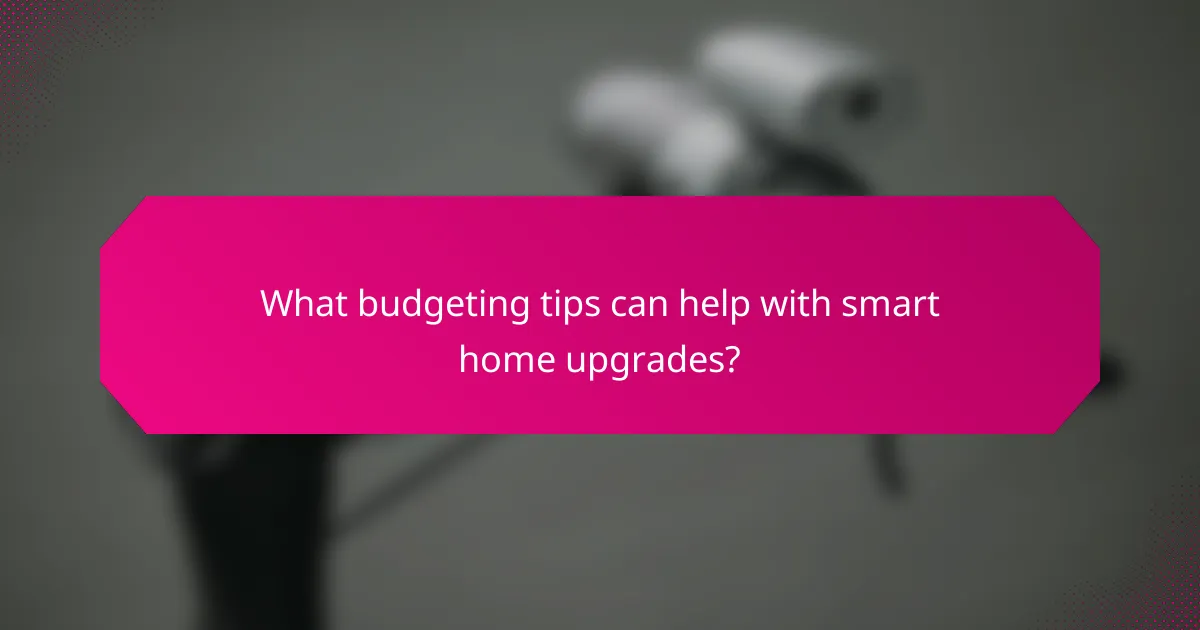
What budgeting tips can help with smart home upgrades?
Effective budgeting for smart home upgrades involves setting a clear financial plan, prioritizing essential improvements, and researching available discounts. These strategies can help you manage costs while enhancing your home’s functionality and efficiency.
Set a clear budget
Establishing a clear budget is the first step in planning your smart home upgrades. Determine how much you can afford to spend without straining your finances. A good rule of thumb is to allocate around 5-10% of your home’s value for upgrades, depending on your goals.
Break down your budget into categories such as devices, installation, and maintenance. This will help you track expenses and make adjustments as needed. Regularly review your budget to ensure you stay on track and avoid overspending.
Prioritize essential upgrades
Focus on upgrades that provide the most value and functionality for your lifestyle. Start with essential items like smart thermostats, security systems, or lighting controls, which can enhance safety and energy efficiency. These upgrades often yield a quicker return on investment.
Consider the long-term benefits of each upgrade. For example, a smart thermostat can reduce energy bills significantly, making it a wise initial investment. Create a list of potential upgrades ranked by importance to guide your spending decisions.
Research available discounts
Look for discounts, rebates, or tax incentives that can reduce the cost of your smart home upgrades. Many utility companies offer rebates for energy-efficient devices, which can help offset initial expenses. Check local government programs that promote smart home technology adoption.
Additionally, compare prices across different retailers and online platforms. Seasonal sales or promotional events can provide significant savings. Signing up for newsletters from manufacturers or retailers may also give you access to exclusive discounts and offers.
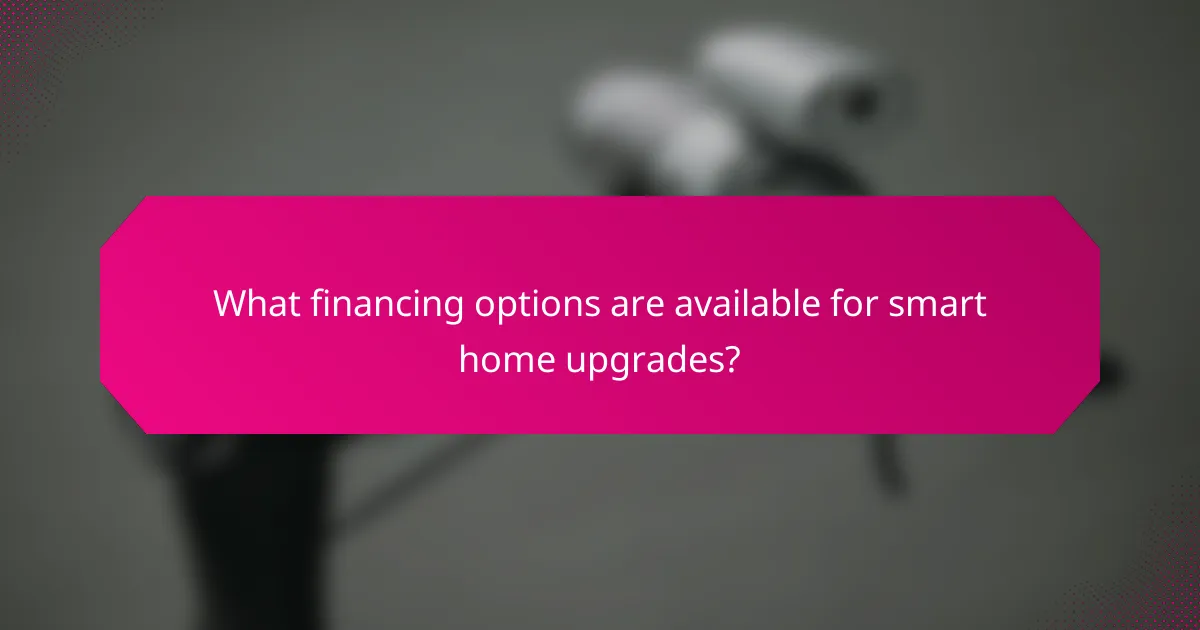
What financing options are available for smart home upgrades?
Several financing options can help you afford smart home upgrades, including home improvement loans, credit card financing, and government grants. Each option has its own advantages and considerations, making it essential to evaluate which best fits your financial situation and upgrade goals.
Home improvement loans
Home improvement loans are specifically designed to fund renovations, including smart home upgrades. These loans typically offer fixed interest rates and terms ranging from a few years to over a decade, allowing for manageable monthly payments.
When considering a home improvement loan, check with local banks or credit unions for competitive rates. Be mindful of your credit score, as it can significantly impact the interest rate you receive. A common range for these loans is between 5% to 10% APR.
Credit card financing
Using credit cards for financing smart home upgrades can be convenient, especially if you have a card with a low-interest rate or a promotional 0% APR offer. This method allows for immediate access to funds, but it’s crucial to pay off the balance before high-interest rates kick in.
Consider using credit cards that offer rewards or cash back on purchases. However, avoid overspending and ensure you can manage the monthly payments to prevent accumulating debt. Aim to keep your credit utilization below 30% for optimal credit health.
Government grants and incentives
Government grants and incentives can significantly reduce the cost of smart home upgrades. Many local and federal programs offer financial assistance for energy-efficient improvements, which may include smart technologies.
Research available grants in your area through government websites or local energy companies. Eligibility often depends on income levels or specific project types. These programs can provide funding that does not require repayment, making them an attractive option for homeowners looking to upgrade sustainably.
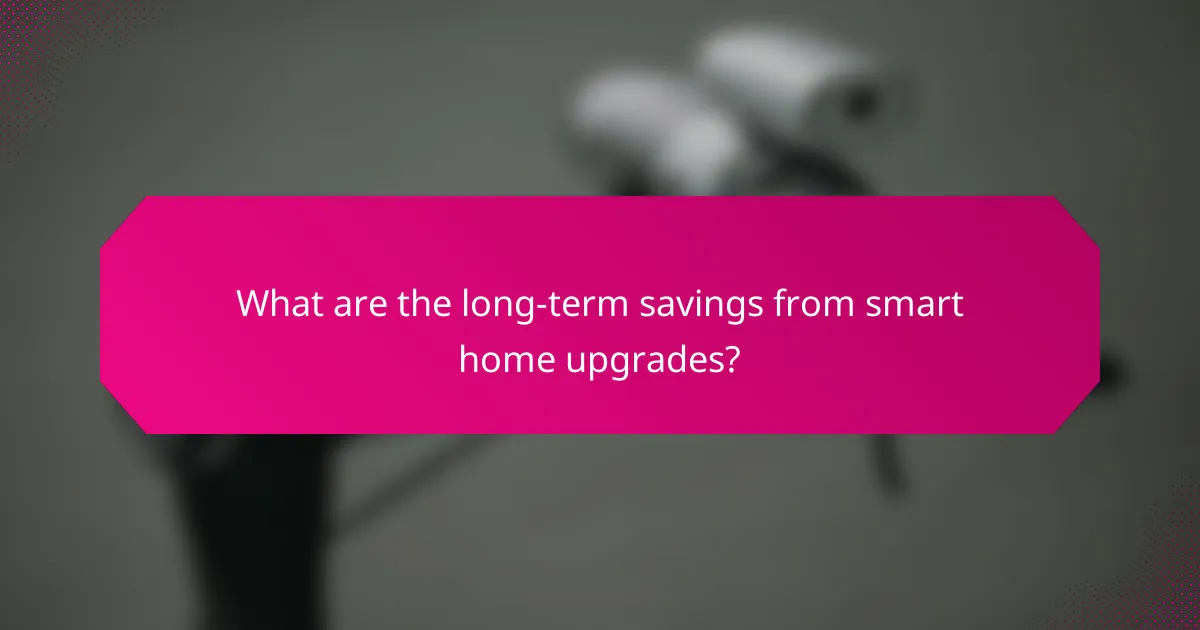
What are the long-term savings from smart home upgrades?
Smart home upgrades can lead to significant long-term savings by enhancing energy efficiency and reducing utility bills. Over time, these upgrades often pay for themselves through lower energy costs and increased home value.
Energy savings from smart thermostats
Smart thermostats can optimize heating and cooling schedules based on your habits, potentially reducing energy consumption by 10-15%. By learning your preferences, these devices adjust temperatures automatically, ensuring comfort while minimizing waste.
When selecting a smart thermostat, consider models that are compatible with your HVAC system and offer features like remote access and energy usage reports. Many utility companies provide rebates for installing energy-efficient devices, which can further offset initial costs.
Cost reductions from smart lighting
Smart lighting systems allow you to control lights remotely and set schedules, which can lead to energy savings of around 30-50%. Using LED bulbs in conjunction with smart controls can significantly decrease electricity usage compared to traditional incandescent bulbs.
To maximize savings, consider installing motion sensors and timers that automatically turn off lights when not in use. Look for smart lighting products that integrate with existing home automation systems for seamless control and management.
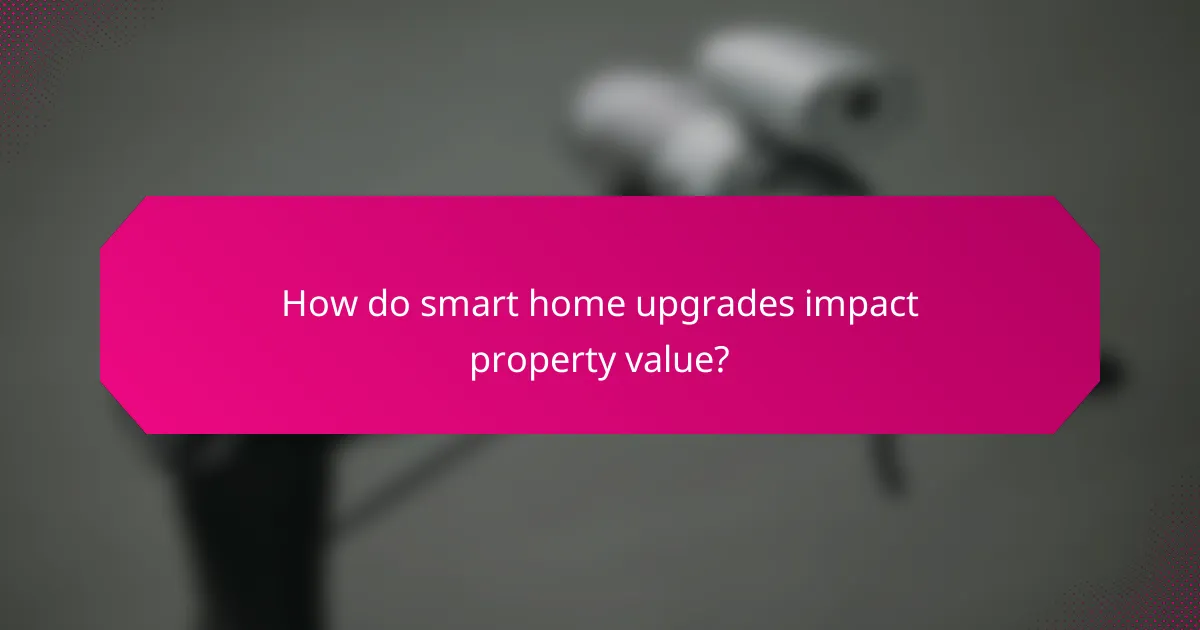
How do smart home upgrades impact property value?
Smart home upgrades can significantly enhance property value by making homes more appealing to potential buyers. These upgrades often lead to increased efficiency, convenience, and security, which are attractive features in today’s real estate market.
Increased home resale value
Investing in smart home technology can lead to a higher resale value, with some estimates suggesting an increase of 5-15% depending on the features installed. Homebuyers are increasingly willing to pay a premium for homes equipped with smart systems, such as smart thermostats, lighting, and security systems.
To maximize your return, focus on upgrades that offer the best value. For instance, smart security systems and energy-efficient devices tend to attract more interest and can justify a higher asking price.
Market demand for smart features
The demand for smart home features has surged, driven by consumer interest in convenience and energy efficiency. Features like smart lighting, automated climate control, and integrated security systems are now considered essential by many buyers.
When planning upgrades, consider local market trends. In urban areas, smart home technology may be more sought after, while in rural regions, the demand might be lower. Researching local preferences can help you prioritize which upgrades to make for the best return on investment.
